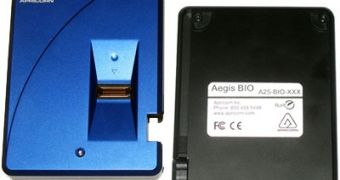Paranoid PC users, rejoice, as Apricorn has released another extraordinary device that allows you to keep your data at your fingertip. Literally. I have been talking a lot lately about data encryption and hard drive security but the Aegis Bio takes it to another level. RFID protected enclosures are extremely convenient and practical, but what happens if you get your hard-drive AND transponder stolen say, from your car? There's nothing that can save your data from the prying eyes.
Apricorn's Aegis Bio is a line of portable hard drives featuring one of the safest methods of authentication, except for the retinal scanner: the fingerprint itself. The drive comes with Hi-Speed USB 2.0 connection that guarantees faster file transfer and maximizes compatibility with other PC systems, real-time 128-bit AES encryption for protecting data as well as the UPEK TouchStrip Fingerprint Sensor with Oxford Controller Chip for biometric access.
The strong encryption algorithm protects the stored data on-the-fly, so unauthorized users will not be able to get to it even if they disassemble the drive from its housing in order to read directly from it. The disk is fastened on a 16-point omni-directional shock mounting system that protects it from damage, even if it has been dropped to the ground. The alternating red and green LED optical panel reflects the current state of the drive (locked and unlocked, respectively).
The enclosure ships with Fujitsu's 2.5-inch MWH2120BH 120GB hard drive that features 8MB of cache and spins at 5400 rpm. The drive ships with a built-in USB cable, and a software disk with the required utility for adding or removing fingerprints from/to the disk's authorization database. In order to add a fingerprint to the authorized list, you only have to swipe your finger three times in a row (in order to ensure an accurate read). The software asks for enrolling two fingers - a good idea if you suffer an injury or burn and can not use one of them.
However, the disk only allows for a total of 10 fingers to be registered at the same time in its database, so if you need to share it with more than 5 (maximum 10 for single finger registrations), you'd rather find another solution.

 14 DAY TRIAL //
14 DAY TRIAL //